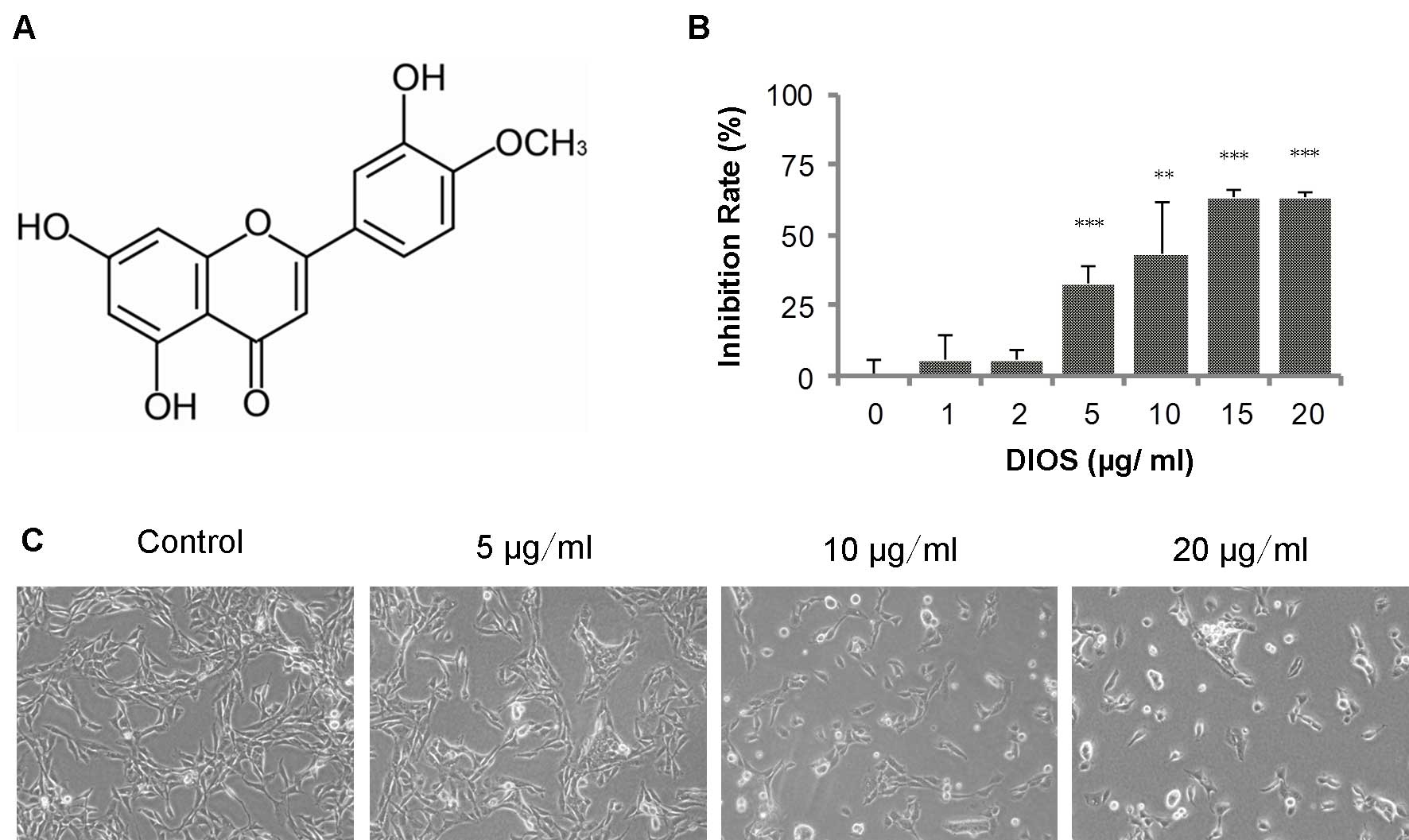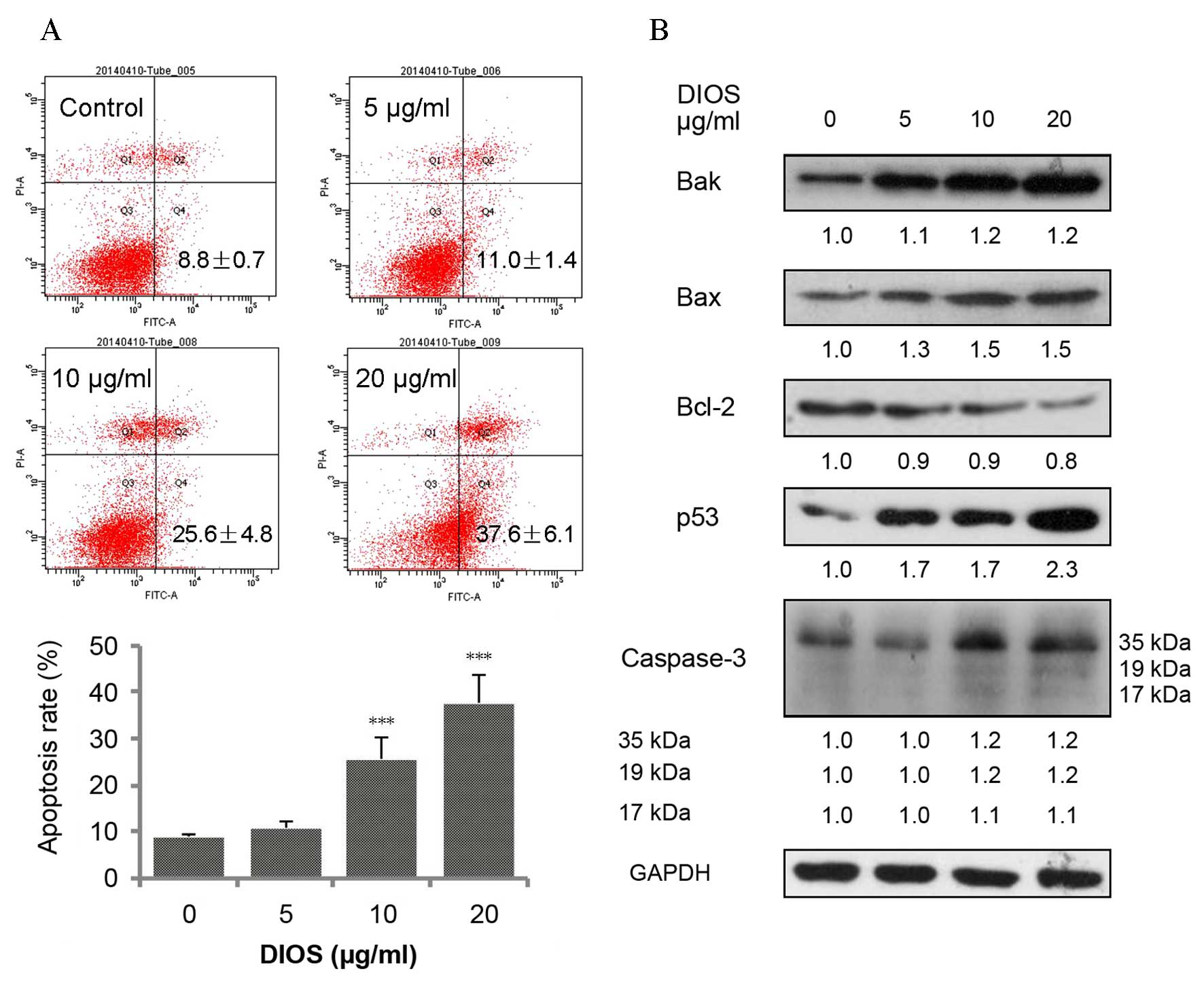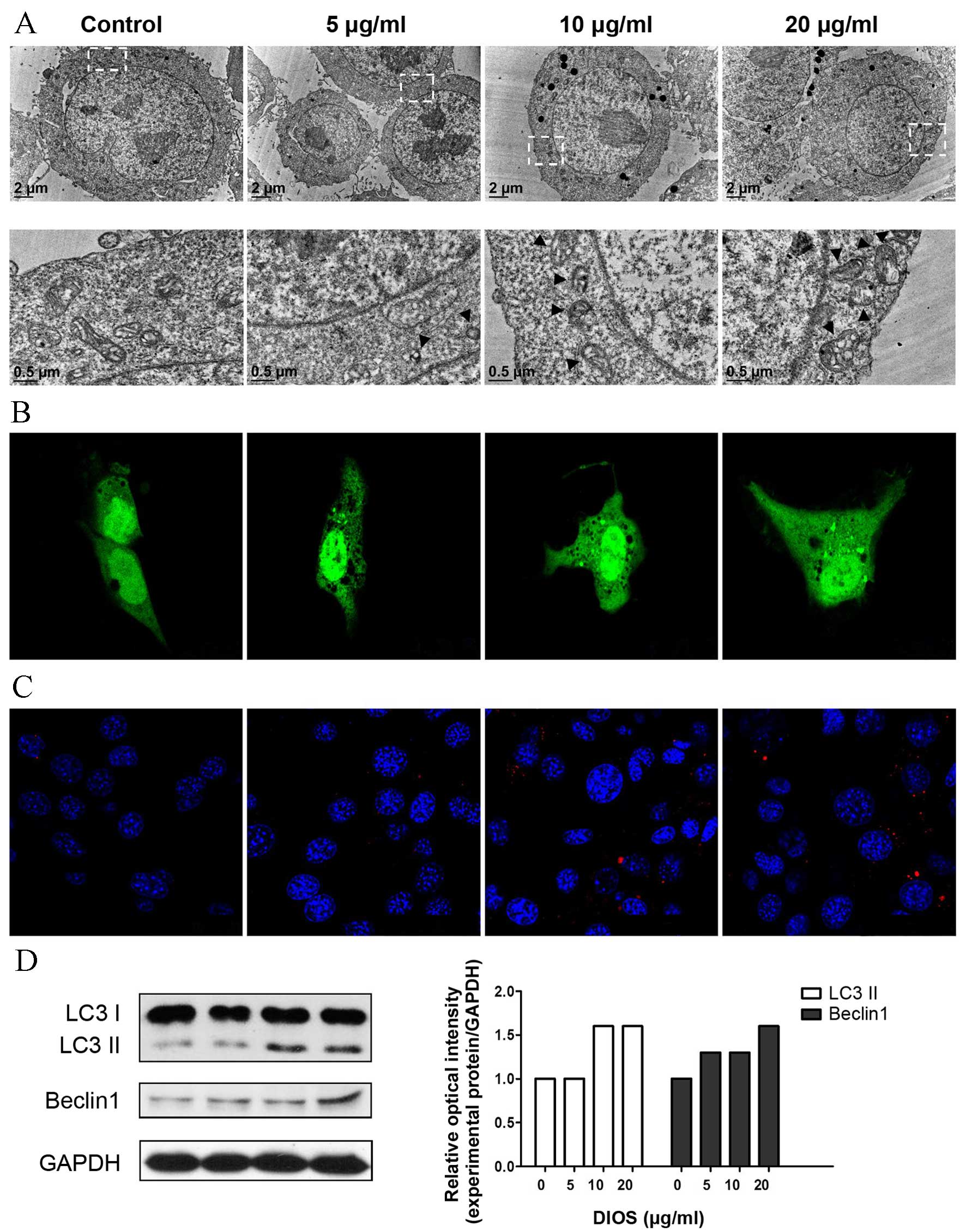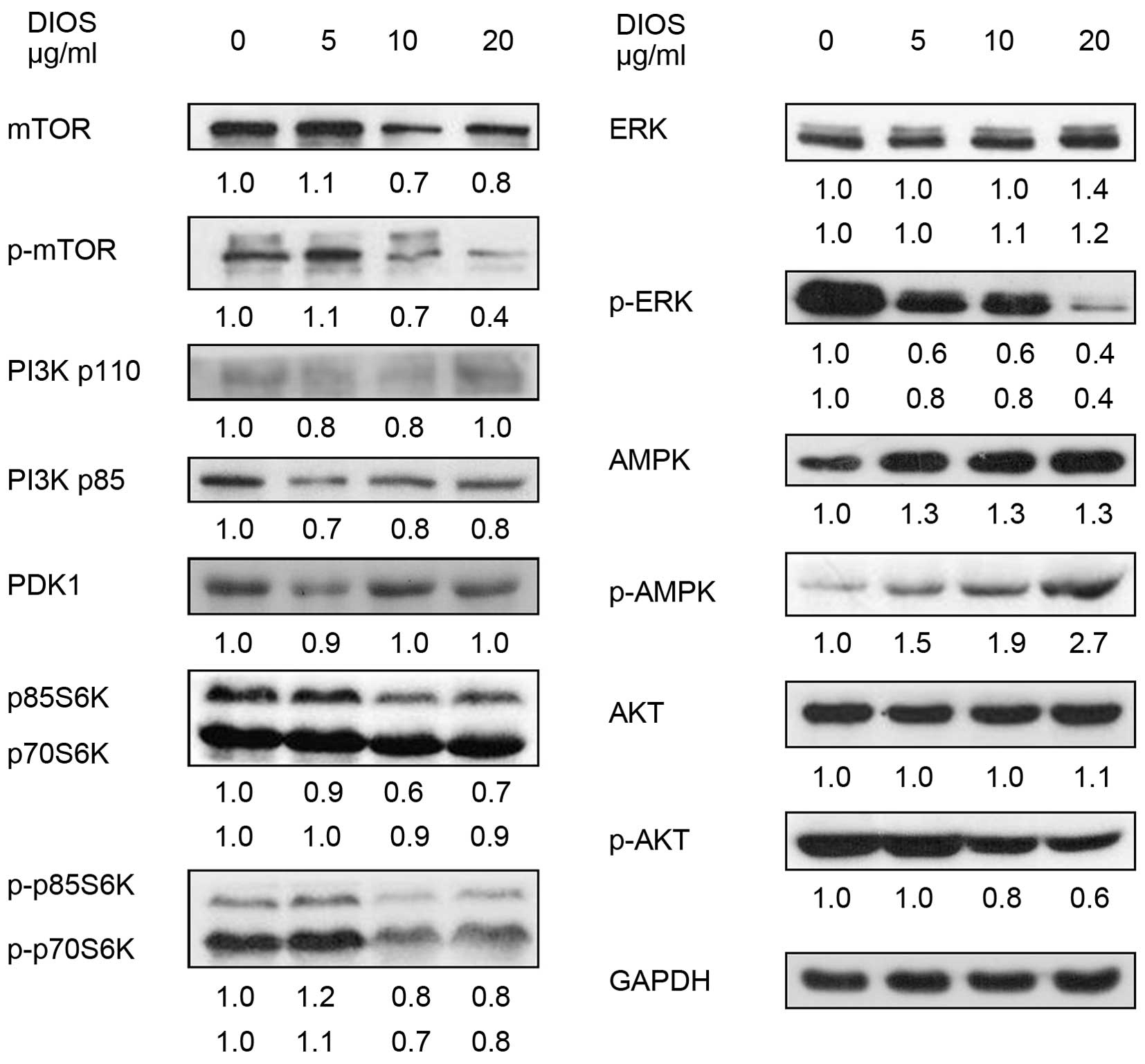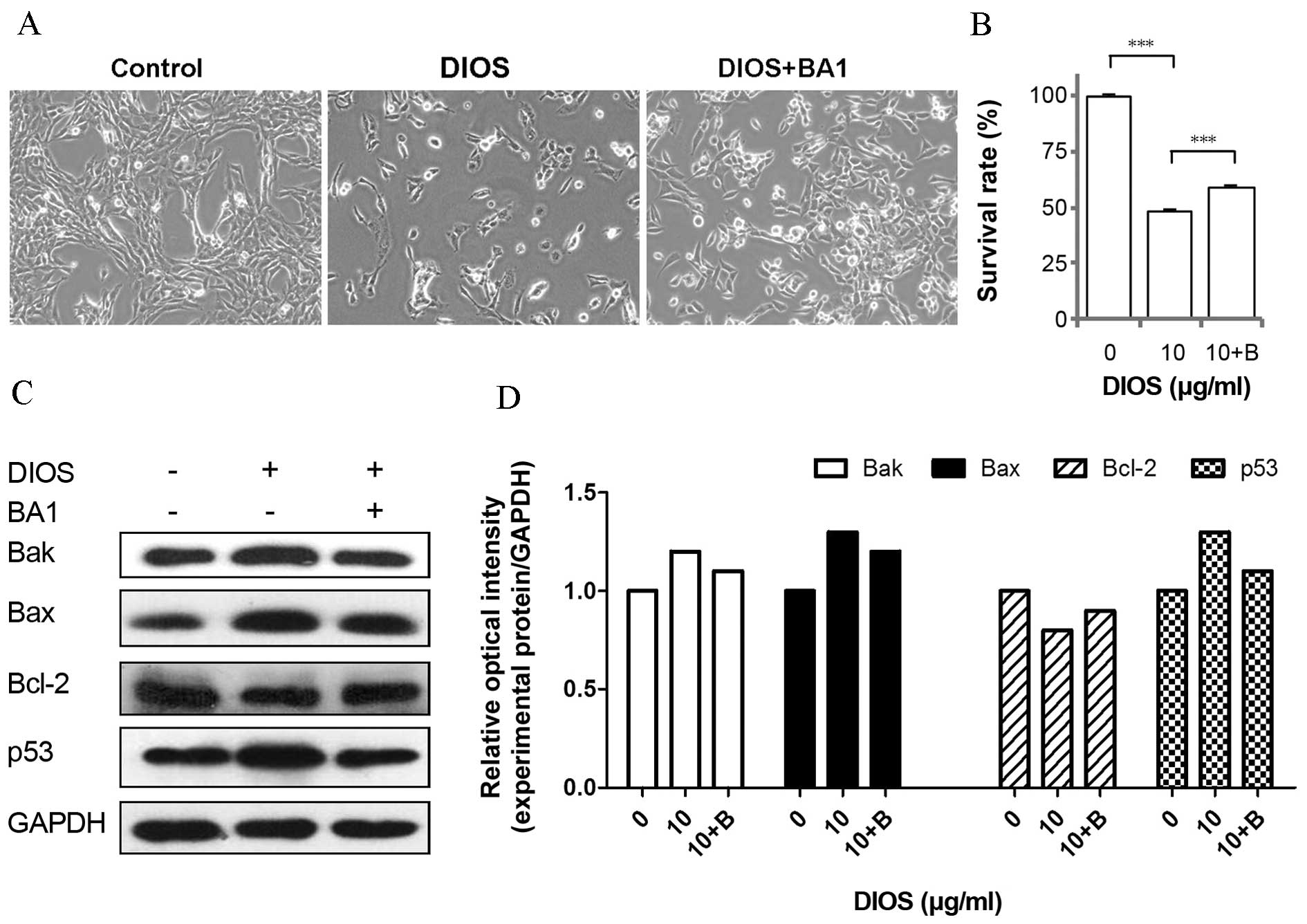|
1
|
Mu H, Lin KX, Zhao H, Xing S, Li C, Liu F,
Lu HZ, Zhang Z, Sun YL, Yan XY, et al: Identification of biomarkers
for hepatocellular carcinoma by semiquantitative
immunocytochemistry. World J Gastroenterol. 20:5826–5838. 2014.
View Article : Google Scholar : PubMed/NCBI
|
|
2
|
Ferlay J, Soerjomataram I, Dikshit R, Eser
S, Mathers C, Rebelo M, Parkin DM, Forman D and Bray F: Cancer
incidence and mortality worldwide: Sources, methods and major
patterns in GLOBOCAN 2012. Int J Cancer. 136:E359–E386. 2015.
View Article : Google Scholar : PubMed/NCBI
|
|
3
|
Jin Y, Chen J, Feng Z, Fan W, Wang Y, Li J
and Tong D: The expression of Survivin and NF-κB associated with
prognostically worse clinicopathologic variables in hepatocellular
carcinoma. Tumour Biol. 35:9905–9910. 2014. View Article : Google Scholar : PubMed/NCBI
|
|
4
|
Kim HY and Park JW: Clinical trials of
combined molecular targeted therapy and locoregional therapy in
hepatocellular carcinoma: Past, present and future. Liver cancer.
3:9–17. 2014. View Article : Google Scholar : PubMed/NCBI
|
|
5
|
Chen L, Wu LL, Zhang ZL, Hu J, Tang M, Qi
CB, Li N and Pang DW: Biofunctionalized magnetic nanospheres-based
cell sorting strategy for efficient isolation, detection and
subtype analyses of heterogeneous circulating hepatocellular
carcinoma cells. Biosens Bioelectron. 85:633–640. 2016. View Article : Google Scholar : PubMed/NCBI
|
|
6
|
Mano Y, Aishima S, Kubo Y, Tanaka Y,
Motomura T, Toshima T, Shirabe K, Baba S, Maehara Y and Oda Y:
Correlation between biological marker expression and fluorine-18
fluorodeoxyglucose uptake in hepatocellular carcinoma. Am J Clin
Pathol. 142:391–397. 2014. View Article : Google Scholar : PubMed/NCBI
|
|
7
|
Zhang QY, Li R, Zeng GF, Liu B, Liu J, Shu
Y, Liu ZK, Qiu ZD, Wang DJ, Miao HL, et al: Dihydromyricetin
inhibits migration and invasion of hepatoma cells through
regulation of MMP-9 expression. World J Gastroenterol.
20:10082–10093. 2014. View Article : Google Scholar : PubMed/NCBI
|
|
8
|
Liu J, Shu Y, Zhang Q, Liu B, Xia J, Qiu
M, Miao H, Li M and Zhu R: Dihydromyricetin induces apoptosis and
inhibits proliferation in hepatocellular carcinoma cells. Oncol
Lett. 8:1645–1651. 2014.PubMed/NCBI
|
|
9
|
Guglielmotto M, Monteleone D, Piras A,
Valsecchi V, Tropiano M, Ariano S, Fornaro M, Vercelli A, Puyal J,
Arancio O, et al: Abeta1-42 monomers or oligomers have different
effects on autophagy and apoptosis. Autophagy. 10:1827–1843. 2014.
View Article : Google Scholar : PubMed/NCBI
|
|
10
|
Kongsuphol P, Mukda S, Nopparat C,
Villarroel A and Govitrapong P: Melatonin attenuates
methamphetamine-induced deactivation of the mammalian target of
rapamycin signaling to induce autophagy in SK-N-SH cells. J Pineal
Res. 46:199–206. 2009. View Article : Google Scholar : PubMed/NCBI
|
|
11
|
Fu J, Shao CJ, Chen FR, Ng HK and Chen ZP:
Autophagy induced by valproic acid is associated with oxidative
stress in glioma cell lines. Neuro Oncol. 12:328–340. 2010.
View Article : Google Scholar : PubMed/NCBI
|
|
12
|
Yao KC, Komata T, Kondo Y, Kanzawa T,
Kondo S and Germano IM: Molecular response of human glioblastoma
multiforme cells to ionizing radiation: Cell cycle arrest,
modulation of cyclin-dependent kinase inhibitors, and autophagy. J
Neurosurg. 98:378–384. 2003. View Article : Google Scholar : PubMed/NCBI
|
|
13
|
Ertmer A, Huber V, Gilch S, Yoshimori T,
Erfle V, Duyster J, Elsässer HP and Schätzl HM: The anticancer drug
imatinib induces cellular autophagy. Leukemia. 21:936–942.
2007.PubMed/NCBI
|
|
14
|
Wu S, Liu B, Zhang Q, Liu J, Zhou W, Wang
C, Li M, Bao S and Zhu R: Dihydromyricetin reduced Bcl-2 expression
via p53 in human hepatoma HepG2 cells. PloS one. 8:e768862013.
View Article : Google Scholar : PubMed/NCBI
|
|
15
|
Spanakis M, Kasmas S and Niopas I:
Simultaneous determination of the flavonoid aglycones diosmetin and
hesperetin in human plasma and urine by a validated GC/MS method:
In vivo metabolic reduction of diosmetin to hesperetin. Biomed
Chromatogr. 23:124–131. 2009. View
Article : Google Scholar : PubMed/NCBI
|
|
16
|
Chan BC, Ip M, Gong H, Lui SL, See RH,
Jolivalt C, Fung KP, Leung PC, Reiner NE and Lau CB: Synergistic
effects of diosmetin with erythromycin against ABC transporter
over-expressed methicillin-resistant Staphylococcus aureus (MRSA)
RN4220/pUL5054 and inhibition of MRSA pyruvate kinase.
Phytomedicine. 20:611–614. 2013. View Article : Google Scholar : PubMed/NCBI
|
|
17
|
Meng JC, Zhu QX and Tan RX: New
antimicrobial mono-and sesquiterpenes from Soroseris hookeriana
subsp. Planta Med. 66:541–544. 2000. View Article : Google Scholar : PubMed/NCBI
|
|
18
|
Chandler D, Woldu A, Rahmadi A, Shanmugam
K, Steiner N, Wright E, Benavente-García O, Schulz O, Castillo J
and Münch G: Effects of plant-derived polyphenols on TNF-alpha and
nitric oxide production induced by advanced glycation endproducts.
Mol Nutr Food Res. 54:(Suppl 2). S141–S150. 2010. View Article : Google Scholar : PubMed/NCBI
|
|
19
|
Liao W, Ning Z, Chen L, Wei Q, Yuan E,
Yang J and Ren J: Intracellular antioxidant detoxifying effects of
diosmetin on 2, 2-azobis(2-amidinopropane) dihydrochloride
(aaph)-induced oxidative stress through inhibition of reactive
oxygen species generation. J Agric Food Chem. 62:8648–8654. 2014.
View Article : Google Scholar : PubMed/NCBI
|
|
20
|
Androutsopoulos VP, Mahale S, Arroo RR and
Potter G: Anticancer effects of the flavonoid diosmetin on cell
cycle progression and proliferation of MDA-MB 468 breast cancer
cells due to CYP1 activation. Oncol Rep. 21:1525–1528.
2009.PubMed/NCBI
|
|
21
|
Kabeya Y, Mizushima N, Yamamoto A,
Oshitani-Okamoto S, Ohsumi Y and Yoshimori T: LC3, GABARAP and
GATE16 localize to autophagosomal membrane depending on form-II
formation. J Cell Sci. 117:2805–2812. 2004. View Article : Google Scholar : PubMed/NCBI
|
|
22
|
Saiki S, Sasazawa Y, Imamichi Y, Kawajiri
S, Fujimaki T, Tanida I, Kobayashi H, Sato F, Sato S, Ishikawa K,
et al: Caffeine induces apoptosis by enhancement of autophagy via
PI3K/Akt/mTOR/p70S6K inhibition. Autophagy. 7:176–187. 2011.
View Article : Google Scholar : PubMed/NCBI
|
|
23
|
Hanahan D and Weinberg RA: Hallmarks of
cancer: The next generation. Cell. 144:646–674. 2011. View Article : Google Scholar : PubMed/NCBI
|
|
24
|
Mauthe M, Jacob A, Freiberger S, Hentschel
K, Stierhof YD, Codogno P and Proikas-Cezanne T:
Resveratrol-mediated autophagy requires WIPI-1-regulated LC3
lipidation in the absence of induced phagophore formation.
Autophagy. 7:1448–1461. 2011. View Article : Google Scholar : PubMed/NCBI
|
|
25
|
Chen H, Gao Y, Wu J, Chen Y, Chen B, Hu J
and Zhou J: Exploring therapeutic potentials of baicalin and its
aglycone baicalein for hematological malignancies. Cancer Lett.
354:5–11. 2014. View Article : Google Scholar : PubMed/NCBI
|
|
26
|
Zhang Q, Liu J, Liu B, Xia J, Chen N, Chen
X, Cao Y, Zhang C, Lu C, Li M and Zhu R: Dihydromyricetin promotes
hepatocellular carcinoma regression via a p53 activation-dependent
mechanism. Sci Rep. 4:46282014.PubMed/NCBI
|
|
27
|
Zeng G, Liu J, Chen H, Liu B, Zhang Q, Li
M and Zhu R: Dihydromyricetin induces cell cycle arrest and
apoptosis in melanoma SK-MEL-28 cells. Oncol Rep. 31:2713–2719.
2014.PubMed/NCBI
|
|
28
|
Liu B, Zhou Z, Zhou W, Liu J, Zhang Q, Xia
J, Liu J, Chen N, Li M and Zhu R: Resveratrol inhibits
proliferation in human colorectal carcinoma cells by inducing
G1/S-phase cell cycle arrest and apoptosis through
caspase/cyclin-CDK pathways. Mol Med Rep. 10:1697–1702.
2014.PubMed/NCBI
|
|
29
|
Androutsopoulos VP, Mahale S, Arroo RR and
Potter G: Anticancer effects of the flavonoid diosmetin on cell
cycle progression and proliferation of MDA-MB 468 breast cancer
cells due to CYP1 activation. Oncol Rep. 21:1525–1528.
2009.PubMed/NCBI
|
|
30
|
Androutsopoulos VP and Spandidos DA: The
flavonoids diosmetin and luteolin exert synergistic cytostatic
effects in human hepatoma HepG2 cells via CYP1A-catalyzed
metabolism, activation of JNK and ERK and P53/P21 up-regulation. J
Nutr Biochem. 24:496–504. 2013. View Article : Google Scholar : PubMed/NCBI
|
|
31
|
Li G, Ma R, Huang C, Tang Q, Fu Q, Liu H,
Hu B and Xiang J: Protective effect of erythropoietin on
beta-amyloid-induced PC12 cell death through antioxidant
mechanisms. Neurosci Lett. 442:143–147. 2008. View Article : Google Scholar : PubMed/NCBI
|
|
32
|
Hao C, Gao L, Zhang Y, Wang W, Yu G, Guan
H, Zhang L and Li C: Acetylated chitosan oligosaccharides act as
antagonists against glutamate-induced pc12 cell death via bcl-2/bax
signal pathway. Mar Drugs. 13:1267–1289. 2015. View Article : Google Scholar : PubMed/NCBI
|
|
33
|
Cheng Y, Ren X, Hait WN and Yang JM:
Therapeutic targeting of autophagy in disease: Biology and
pharmacology. Pharmacol Rev. 65:1162–1197. 2013. View Article : Google Scholar : PubMed/NCBI
|
|
34
|
Lorenzi PL, Claerhout S, Mills GB and
Weinstein JN: A curated census of autophagy-modulating proteins and
small molecules: Candidate targets for cancer therapy. Autophagy.
10:1316–1326. 2014. View Article : Google Scholar : PubMed/NCBI
|
|
35
|
Zhong W, Zhu H, Sheng F, Tian Y, Zhou J,
Chen Y, Li S and Lin J: Activation of the MAPK11/12/13/14 (p38
MAPK) pathway regulates the transcription of autophagy genes in
response to oxidative stress induced by a novel copper complex in
HeLa cells. Autophagy. 10:1285–1300. 2014. View Article : Google Scholar : PubMed/NCBI
|
|
36
|
Pan X, Zhang X, Sun H, Zhang J, Yan M and
Zhang H: Autophagy inhibition promotes 5-fluorouraci-induced
apoptosis by stimulating ROS formation in human non-small cell lung
cancer A549 cells. PLoS One. 8:e566792013. View Article : Google Scholar : PubMed/NCBI
|
|
37
|
Sui X, Chen R, Wang Z, Huang Z, Kong N,
Zhang M, Han W, Lou F, Yang J, Zhang Q, et al: Autophagy and
chemotherapy resistance: A promising therapeutic target for cancer
treatment. Cell Death Dis. 4:e8382013. View Article : Google Scholar : PubMed/NCBI
|
|
38
|
Yu L, Alva A, Su H, Dutt P, Freundt E,
Welsh S, Baehrecke EH and Lenardo MJ: Regulation of an ATG7-beclin
1 program of autophagic cell death by caspase-8. Science.
304:1500–1502. 2004. View Article : Google Scholar : PubMed/NCBI
|
|
39
|
Amaravadi RK and Thompson CB: The roles of
therapy-induced autophagy and necrosis in cancer treatment. Clin
Cancer Res. 13:7271–7279. 2007. View Article : Google Scholar : PubMed/NCBI
|
|
40
|
Yuan J, Lei Z, Wang X, Zhu F and Chen D:
Ruthenium complex Λ-WH0402 induces hepatocellular carcinoma LM6
(HCCLM6) cells death by triggering Beclin-1-dependent autophagy
pathway. Metallomics. 7:896–907. 2015. View Article : Google Scholar : PubMed/NCBI
|
|
41
|
Xia J, Guo S, Fang T, Feng D, Zhang X,
Zhang Q, Liu J, Liu B, Li M and Zhu R: Dihydromyricetin induces
autophagy in HepG2 cells involved in inhibition of mTOR and
regulating its upstream pathways. Food Chem Toxicol. 66:7–13. 2014.
View Article : Google Scholar : PubMed/NCBI
|
|
42
|
Niu NK, Wang ZL, Pan ST, Ding HQ, Au GH,
He ZX, Zhou ZW, Xiao G, Yang YX, Zhang X, et al: Pro-apoptotic and
pro-autophagic effects of the Aurora kinase A inhibitor alisertib
(MLN8237) on human osteosarcoma U-2 OS and MG-63 cells through the
activation of mitochondria-mediated pathway and inhibition of p38
MAPK/PI3K/Akt/mTOR signaling pathway. Drug Des Devel Ther.
9:1555–1584. 2015.PubMed/NCBI
|
|
43
|
Shi L, Zhang T, Liang X, Hu Q, Huang J,
Zhou Y, Chen M, Zhang Q, Zhu J and Mi M: Dihydromyricetin improves
skeletal muscle insulin resistance by inducing autophagy via the
AMPK signaling pathway. Mol Cell Endocrinol. 409:92–102. 2015.
View Article : Google Scholar : PubMed/NCBI
|
|
44
|
Shin JH, Min SH, Kim SJ, Kim YI, Park J,
Lee HK and Yoo OJ: TAK1 regulates autophagic cell death by
suppressing the phosphorylation of p70 S6 kinase 1. Sci Rep.
3:15612013. View Article : Google Scholar : PubMed/NCBI
|
|
45
|
Zhang J, Ma K, Qi T, Wei X, Zhang Q, Li G
and Chiu JF: P62 regulates resveratrol-mediated Fas/Cav-1 complex
formation and transition from autophagy to apoptosis. Oncotarget.
6:789–801. 2014. View Article : Google Scholar
|
|
46
|
Jakhar R, Paul S, Bhardwaj M and Kang SC:
Astemizole-Histamine induces Beclin-1-independent autophagy by
targeting p53-dependent crosstalk between autophagy and apoptosis.
Cancer Lett. 372:89–100. 2016. View Article : Google Scholar : PubMed/NCBI
|
|
47
|
Rah B, ur Rasool R, Nayak D, Yousuf SK,
Mukherjee D, Kumar LD and Goswami A: PAWR-mediated suppression of
BCL2 promotes switching of 3-azido withaferin A (3-AWA)-induced
autophagy to apoptosis in prostate cancer cells. Autophagy.
11:314–331. 2015. View Article : Google Scholar : PubMed/NCBI
|
|
48
|
Luo S and Rubinsztein DC: Apoptosis blocks
Beclin 1-dependent autophagosome synthesis: An effect rescued by
Bcl-xL. Cell Death Differ. 17:268–277. 2010. View Article : Google Scholar : PubMed/NCBI
|
|
49
|
Pattingre S, Tassa A, Qu X, Garuti R,
Liang XH, Mizushima N, Packer M, Schneider MD and Levine B: Bcl-2
antiapoptotic proteins inhibit Beclin 1-dependent autophagy. Cell.
122:927–939. 2005. View Article : Google Scholar : PubMed/NCBI
|















